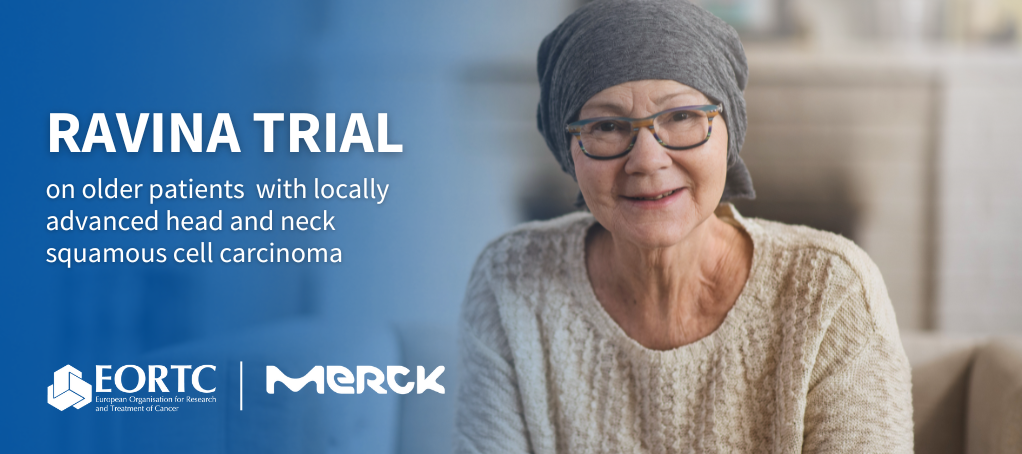EORTC launches a prominent clinical trial in older patients with locally advanced (LA) HNSCC (Head and Neck Squamous Cell Carcinoma)
14 Dec 2023
Brussels, Belgium – 14 December 2023 – The European Organisation for Research and Treatment of Cancer (EORTC) announced on 15 November 2023 the launch of EORTC 2120 RAVINA trial supported by the EORTC Head and Neck Cancer Group and by Merck entitled “Radiotherapy plus xevinapant or placebo in older patients with locally advanced head and neck squamous cell carcinoma: a randomized phase II study”.
This randomised, placebo-controlled, phase II study will determine the efficacy and safety of xevinapant with radiotherapy in older patients. Patients aged 70 years or older with LA-HNSCC of oral cavity, oropharynx, hypopharynx, or larynx for which treatment with radiotherapy only is recommended will be enrolled in the study.
This study aims to find out whether the addition of xevinapant increases response to radiotherapy, progression free survival and overall survival and may impact health-related quality of life, frailty and circulating markers.
Launch of the trial across Europe
Ten countries have been selected to participate in the trial (Italy, France, Belgium, Spain, Ireland, Germany, the Netherlands, Slovenia, Norway and the United Kingdom) with 27 sites expected to enrol approximately 230 patients.
Merck will provide xevinapant and the placebo. The study was submitted under the new EU Clinical Trial Regulation in March 2023. Today, 7 sites have been authorised in five countries. First Patient In has been enrolled in Belgium.
Xevinapant (formerly known as Debio 1143) is an investigational, orally taken Inhibitor of Apoptosis Protein (IAP) inhibitor that may promote cancer cell death via apoptosis. Xevinapant is believed to sensitize tumour cells for various cytotoxic therapies, including radiotherapy and chemotherapy.
Improving progression-free survival with limited toxicity in older patients
“Locally advanced head and neck cancer is a debilitating disease that is increasingly diagnosed in older patients. These patients often do not tolerate or benefit from addition of chemotherapy to radiotherapy and are therefore treated with radiotherapy alone. The disease relapses in more than half of the patients. An earlier study showed that xevinapant added to chemoradiotherapy reduced relapses and improved overall survival with limited extra toxicity. We therefore hypothesize that xevinapant will also improve efficacy of radiotherapy alone” said Dr. Sjoukje Oosting, Medical Oncologist at the University Medical Centre in Groningen, the Netherlands, lead investigator of the EORTC 2120 RAVINA study.
About EORTC Head and Neck Cancer Group
The EORTC Head and Neck Cancer Group (HNCG) is a group of the most important academic hospitals in Europe aiming to develop new standards of care for HN cancer patients. Our research focus is the evaluation of innovative treatments and multidisciplinary approaches to increase survival and improve the quality of life of all patients with HN cancer.
Media Contacts
Caroline Moulins
Email: caroline.moulins@eortc.org
Related News
PET imaging widely used in European brain tumour centres, survey shows
1 Jul 2025
New EORTC Leadership: President-Elect and Scientific Chairs Council
27 Jun 2025
First Site Activated in EU-Funded DE-ESCALATE Clinical Trial on Advanced Metastatic Prostate Cancer
10 Jun 2025
EORTC publishes its 2024 Annual Report: Driving progress in cancer treatment, together
4 Jun 2025
EORTC in the spotlight at ASCO 2025
4 Jun 2025
EORTC’s presence at ASCO 2025
28 May 2025
Celebrating Clinical Trials Day 2025 with EORTC’s Young and Early Career Investigators
20 May 2025
New commentary urges a rethink of quality of life metrics in cancer care economics in the context of EU HTA reform
19 May 2025
EORTC Quality of Life Conference 2025 wraps with strong call for patient-centred innovation in oncology
14 May 2025
Defining the role of pragmatic clinical trials in clinical cancer research: outcomes of a collaborative workshop hosted by the European Organisation for Research and Treatment of Cancer (EORTC)
5 May 2025


